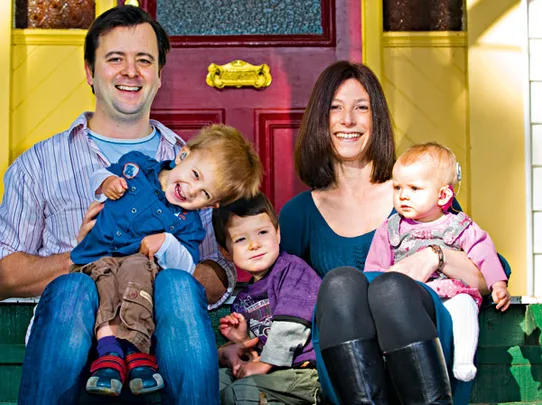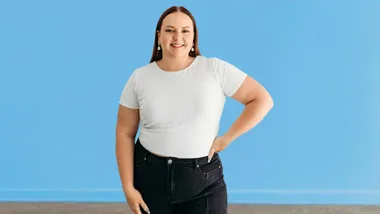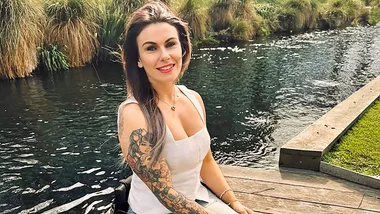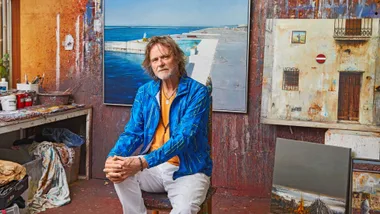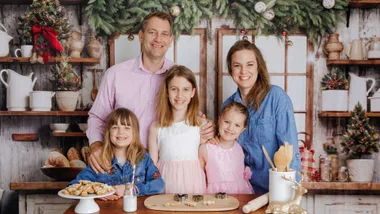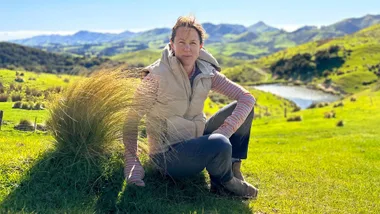An Auckland couple remortgaged their home to give their deaf kids the best possible chance.
All mothers burst with pride when their child says their first word but for Shona Gilby, being called “oum” by her two-year-old for the first time was extra-special.
Shona’s two youngest children are deaf. So it made sense to Shona (33) and her husband Mike (35) to re-mortgage their house in Auckland to fit both Aaron (2) and Isla (eight months) with cochlear implants – devices that stimulate hearing in the brain, also known as bionic hearing.
And when Aaron, who has the hearing age of a six-month-old, began speaking for the fi rst time and Isla started babbling last week, they say any concerns about their $90,000 investment disappeared. Lewis (3) was born with perfect hearing, so Shona and Mike had no idea they both carried the gene that causes hearing loss and, in fact, had a one-in-four chance of having a deaf child.
When baby Aaron followed, he failed two hearing tests, and his parents were shocked. “We were very worried, but I was clinging to the hope that it was just glue ear,” Shona says. Shona and Mike tried desperately to get Aaron to respond to loud noises by clapping and banging doors, to no avail.
“We knew he wasn’t startling at loud noises, but it’s very hard to know with young babies. They can respond to things like shadows and light. I remember once we shut the car door and he responded but, thinking back, it was probably just the vibration.”
The diagnosis that Aaron was profoundly deaf in one ear, and had severe hearing loss in the other, left Shona and Mike totally devastated. “It came out of nowhere and we had no idea what caused it. Trying to keep hearing aids on a 10-week-old baby is next to impossible,” recalls Shona. “We were very sad because we didn’t know what to do about it. I had heard about cochlear implants because I’m a teacher and I had taught someone who had one, so I knew a little bit.”
Initially, they decided to see if Aaron could learn to speak with just his hearing aid but his hearing got progressively worse. By his first birthday his parents were increasingly concerned. “He would pull his hearing aids out up to 50 times an hour,” Shona explains. “We didn’t want to focus on teaching him sign language, but he was making no progress and we were worried.”
When doctors discovered that Aaron was profoundly deaf in both ears, it was recommended that the little boy be fitted with cochlear implants and, six months later, it was done. When Shona became pregnant with Isla after emigrating to New Zealand, the couple knew there was a chance she would also be born deaf, but they decided against Shona having an amniocentesis test to check their new baby for the faulty gene.
But one of the first stops the family made after their daughter’s birth was at The Hearing House in Auckland to get baby Isla’s hearing tested immediately. Sadly, the family discovered that their new addition was profoundly deaf in both ears. “More than anything I hoped that she wouldn’t be deaf. However, I do think the one good thing to come out of all this is that at least Aaron has someone in the family he can relate to,” Shona says.
“All the children have a really good relationship but Isla and Aaron are especially close. They do a lot of their therapy together and he understands her devices – if they come off he tries to put them back on her.” It takes about a month for children to get used to hearing sounds after having a cochlear implant operation. The sound has been described as being like a fire siren going off in their heads until their brain learns to adapt.
But this wasn’t the only difficulty the family would have to face. In New Zealand only one cochlear implant for each child is taxpayer-funded, so Shona and Mike decided they would re-mortgage their house to pay for their children to have the devices in both ears.
The children have made great progress since their implants were fitted. A lot of this is due to their committed mum Shona, who practises speech therapy with both children every day, while also trying to ensure her hearing son, Lewis, doesn’t feel left out of things. “It’s very full-on,” she admits. “But we think it’s worth it. Just 15 years ago, our children would have been going to deaf schools and communicating only with sign language.
“But now, they have amazing futures ahead of them. We fully expect Aaron and Isla to speak and talk and listen and do everything they want to do.”
Vicky Tyler
*
*
